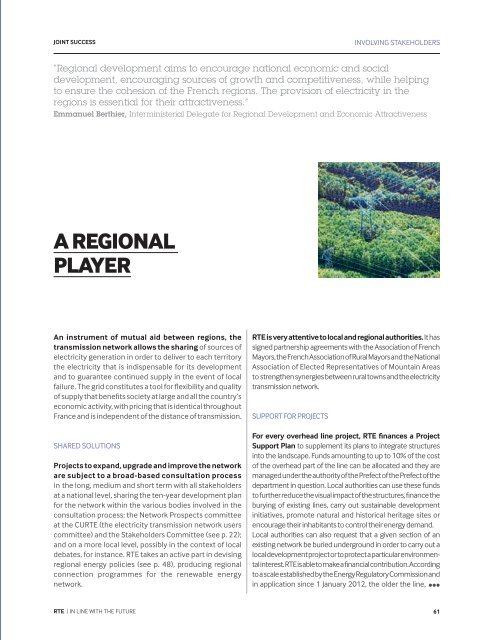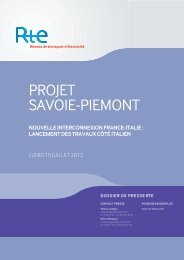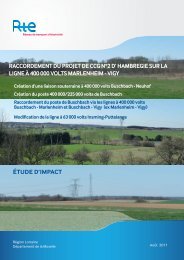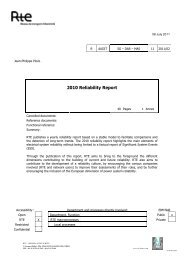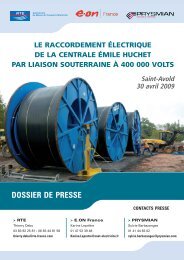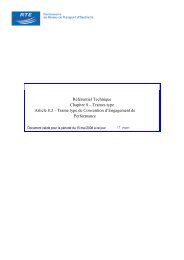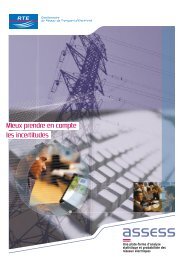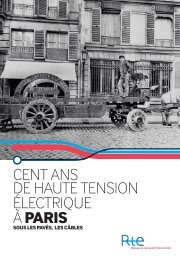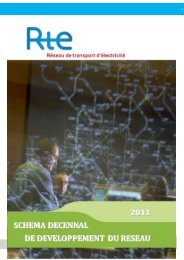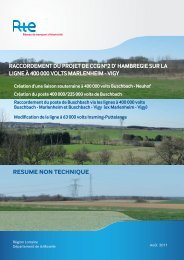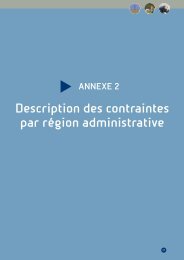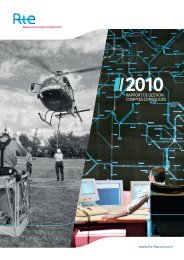2012 Activity and sustainable development report - RTE
2012 Activity and sustainable development report - RTE
2012 Activity and sustainable development report - RTE
Create successful ePaper yourself
Turn your PDF publications into a flip-book with our unique Google optimized e-Paper software.
JOINT SUCCESSINVOLVING STAKEHOLDERS“Regional <strong>development</strong> aims to encourage national economic <strong>and</strong> social<strong>development</strong>, encouraging sources of growth <strong>and</strong> competitiveness, while helpingto ensure the cohesion of the French regions. The provision of electricity in theregions is essential for their attractiveness.”Emmanuel Berthier, Interministerial Delegate for Regional Development <strong>and</strong> Economic AttractivenessA REGIONALPLAYERAn instrument of mutual aid between regions, thetransmission network allows the sharing of sources ofelectricity generation in order to deliver to each territorythe electricity that is indispensable for its <strong>development</strong><strong>and</strong> to guarantee continued supply in the event of localfailure. The grid constitutes a tool for flexibility <strong>and</strong> qualityof supply that benefi ts society at large <strong>and</strong> all the country’seconomic activity, with pricing that is identical throughoutFrance <strong>and</strong> is independent of the distance of transmission.SHARED SOLUTIONSProjects to exp<strong>and</strong>, upgrade <strong>and</strong> improve the networkare subject to a broad-based consultation processin the long, medium <strong>and</strong> short term with all stakeholdersat a national level, sharing the ten-year <strong>development</strong> planfor the network within the various bodies involved in theconsultation process: the Network Prospects committeeat the CU<strong>RTE</strong> (the electricity transmission network userscommittee) <strong>and</strong> the Stakeholders Committee (see p. 22);<strong>and</strong> on a more local level, possibly in the context of localdebates, for instance. <strong>RTE</strong> takes an active part in devisingregional energy policies (see p. 48), producing regionalconnection programmes for the renewable energynetwork.<strong>RTE</strong> is very attentive to local <strong>and</strong> regional authorities. It hassigned partnership agreements with the Association of FrenchMayors, the French Association of Rural Mayors <strong>and</strong> the NationalAssociation of Elected Representatives of Mountain Areasto strengthen synergies between rural towns <strong>and</strong> the electricitytransmission network.SUPPORT FOR PROJECTSFor every overhead line project, <strong>RTE</strong> finances a ProjectSupport Plan to supplement its plans to integrate structuresinto the l<strong>and</strong>scape. Funds amounting to up to 10% of the costof the overhead part of the line can be allocated <strong>and</strong> they aremanaged under the authority of the Prefect of the Prefect of thedepartment in question. Local authorities can use these fundsto further reduce the visual impact of the structures, finance theburying of existing lines, carry out <strong>sustainable</strong> <strong>development</strong>initiatives, promote natural <strong>and</strong> historical heritage sites orencourage their inhabitants to control their energy dem<strong>and</strong>.Local authorities can also request that a given section of anexisting network be buried underground in order to carry out alocal <strong>development</strong> project or to protect a particular environmentalinterest. <strong>RTE</strong> is able to make a financial contribution. Accordingto a scale established by the Energy Regulatory Commission <strong>and</strong>in application since 1 January <strong>2012</strong>, the older the line, •••<strong>RTE</strong> | IN LINE WITH THE FUTURE 61


